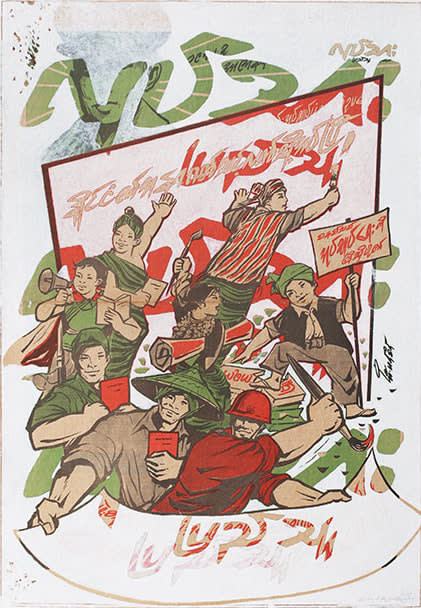Tun Win Aung and Wah Nu
White Piece #0181: The Working People, 2015-2016
Acrylic and journal on canvas
Original Sizes Available:
68.3 x 50.5 cm
68.3 x 50.5 cm
Wah Nu was born in 1977 in Yangon, Myanmar, and Tun Win Aung was born in 1975 in Ywalut, Myanmar. Both artists graduated from the University of Culture, Yangon, in...
Wah Nu was born in 1977 in Yangon, Myanmar, and Tun Win Aung was born in 1975 in Ywalut, Myanmar. Both artists graduated from the University of Culture, Yangon, in 1998, Wah Nu with a BA in music, Tun Win Aung with a BA in sculpture. After completing her studies, Wah Nu turned to painting and video, while Tun Win Aung extended his practice to performance, multimedia work, and painting. He has also created several site-specific outdoor installations, often involving Myanmar’s landscape. In addition to working individually, this husband and wife also collaborate with one another, addressing elements of historical and contemporary culture, established custom and innovative practice. They approach the natural and built environments of their native country with an ecological sensitivity motivated by animistic Buddhist beliefs. A sensuous exploration of color and light, pursued across different mediums, lends much of their work a dreamlike atmosphere.
The project entitled "One Thousand Pieces (of White)" started in 2009. With this collection of painting on old newspapers, our focus with was to represent the 30 years of our lives passed under the “utopia of socialism” or “hunted days of military junta.” In order to refer to the experiences that we had, and to reflect the atmosphere of that time (that we often remember whether they may be good or ugly), we would select the most memorable 1,000 news items out of those we had contact with all our lives, and number them. The words we always remember, the sayings, the pictures, the signs, the events, and the materials that we had contact with in our daily lives, will be collected piecemeal, bit by bit, will be white layer by layer. That is how we would do. All are belongings of the past, a distant past, too faint to be seen clearly. But whenever we ponder, they talk about our roots, such as, ‘where we come from’.
When we were young, the “public” meant the workers or the farmers to us. One thing is sure that they were the labourers using their physical body and strength. That’s what we understood – that was “worker”, the working people. Well, the people in the country are working. They are like parents. “Parents like people” – they have been addressing the public with that phrase again and again and again. The everyday term, “The Working People” that was issued on Martyr’s Day, 1972, read “The new State Constitution in accordance with General Aung San’s will: the future of the country is now in your hands.” But the country is not in the people’s hands even after 40+ years.
The project entitled "One Thousand Pieces (of White)" started in 2009. With this collection of painting on old newspapers, our focus with was to represent the 30 years of our lives passed under the “utopia of socialism” or “hunted days of military junta.” In order to refer to the experiences that we had, and to reflect the atmosphere of that time (that we often remember whether they may be good or ugly), we would select the most memorable 1,000 news items out of those we had contact with all our lives, and number them. The words we always remember, the sayings, the pictures, the signs, the events, and the materials that we had contact with in our daily lives, will be collected piecemeal, bit by bit, will be white layer by layer. That is how we would do. All are belongings of the past, a distant past, too faint to be seen clearly. But whenever we ponder, they talk about our roots, such as, ‘where we come from’.
When we were young, the “public” meant the workers or the farmers to us. One thing is sure that they were the labourers using their physical body and strength. That’s what we understood – that was “worker”, the working people. Well, the people in the country are working. They are like parents. “Parents like people” – they have been addressing the public with that phrase again and again and again. The everyday term, “The Working People” that was issued on Martyr’s Day, 1972, read “The new State Constitution in accordance with General Aung San’s will: the future of the country is now in your hands.” But the country is not in the people’s hands even after 40+ years.
